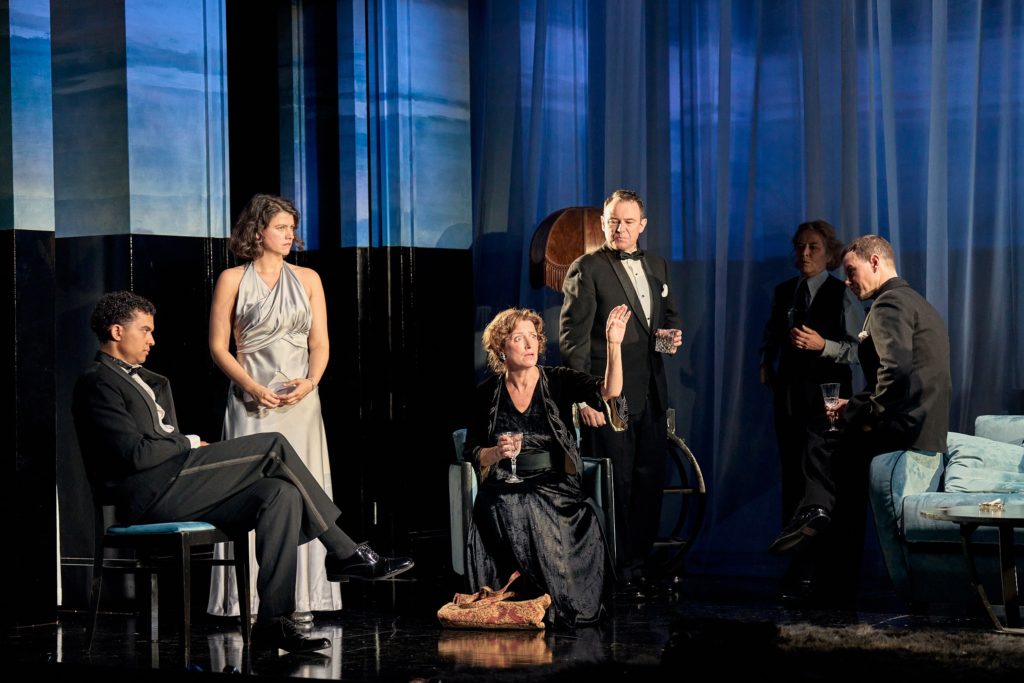
A WELL-TOLD story doesn’t lose its power to capture the imagination. Agatha Christie’s work continues to be enjoyed decades later. Times change, our love of a good murder mystery does not. While the original venue for the play was bombed out during the Second World War, this York performance looked sold out and deservedly so.
And Then There Were None is the story of ten strangers, lured to an island by various deceits in order to reveal their past sins and receive their comeuppance. The opening scenes play out leisurely, perhaps too leisurely, as we are introduced to the locked-down guests. In lesser hands, these characters could easily come across as dated clichés, but the longer they live, the more depths we see.
Blessed with director Lucy Bailey at the helm and a top-flight cast, you are in for an enjoyable tense evening. Bailey has wisely not deconstructed Christie’s bomb-proof plot. The updates are mostly to bring depth and nuance. Modern tastes are thrown a bone with a slow-motion sequence here, a memory there.
Most of the deaths thankfully still take place off stage and the social order remains implacably fixed. The same-sex kiss between Lucy Tregear as George Rogers (updating the original male butler) and Jane Pinchbeck (Nicola May-Taylor) drew gasps in Cambridge but barely raise an eyebrow in York.
This is an ensemble piece and now mid-tour is operating at its peak. Once the thrilling machinery of murder is running, each comes to the fore. Movement director Ayse Tashkiran has cleverly arranged the characters’ comings and goings so that each is both inquisitor and “inquisited” upon.
Joseph Beatie as adventurer Philip Lombard keeps his head more than others, and his performance is commendably textured. Bob Barrett, once the rumpled doctor Sacha Levy in Holby City, is again a rumpled doctor. He clearly relishes his character’s dark night of the soul after the interval.
David Yelland is more debonair than ice as Judge Wargrave; suavely seeking to control proceedings as he once did in court; hiding his steel beneath an impeccably unruffled exterior. He could have made mincemeat of General MacKenzie, played with refreshing humanity and without bombast by Jeffery Kissoon.
The female members of the cast struck different notes; Treagar brings both resolve and enough drunken tenderness to her butler, while Katy Stephens is a formidably trenchant force as religious Emily Brent. The minor roles remain more one dimensional: callow, nervy or late with the milk as the plot demands.
Mike Britton’s set functions on a number of levels, a concave beach/sky in the background to represent Soldier Island, minimalist furniture (ageless but for the rug) and employing layers (both physical and psychological) seen through see through curtains. Bailey makes good, if sparing use of these layers to give us flashbacks into what ails the characters. The audience are the faces watching safely in the dark.
The suspense becomes irresistible. It’s hard to imagine a modern thriller without Christie’s contributions to the final twist and this one does not disappoint, pulling no punches.
This is a play where the characters watch each other closely. There is no let-up in the second act. Chris Davey’s lighting becomes more stark; up lit to really accentuate the faces and their claustrophobia. The red lighting for the scene reminiscent of A Midsummer’s Night Dream is effective, but the tableau itself is drawn in too broad strokes. The sound from Elizabeth Purnell is gentle, distant and understated – quietly drawing you in.
Without giving too much away, Andrew Lancel’s William Blore and Sophie Walter’s Vera Claythorne really stand out as the play rolls mercilessly on. Retired police inspector Blore is a very welcome guest, with many of the best lines, most of the laughs, and the biscuits. Lancel performs with assured timing and a depth and subtlety to his gradual breakdown.
You really don’t know what to believe about Vera Claythorne, thanks to Walter’s ability to convince you of anything she pleases. By turns modern and strong, damaged and vulnerable, Walter is arguably the most, perhaps only, sympathetic character. Or is that Christie playing tricks again? Guilty or not, her performance is unmissable.
Low numbers of tickets remain for the rest of this week’s run, but time is running out to work out whodunnit. Performances: tonight and tomorrow, 7.30pm; Saturday, 2.30pm, 7.30pm. Box office: atgtickets.com/york. Age guidance: 12 plus.

I enjoyed this reworking of a Christie classic but foundthe seats at the Grand Opera House very cramped and uncomfortable.